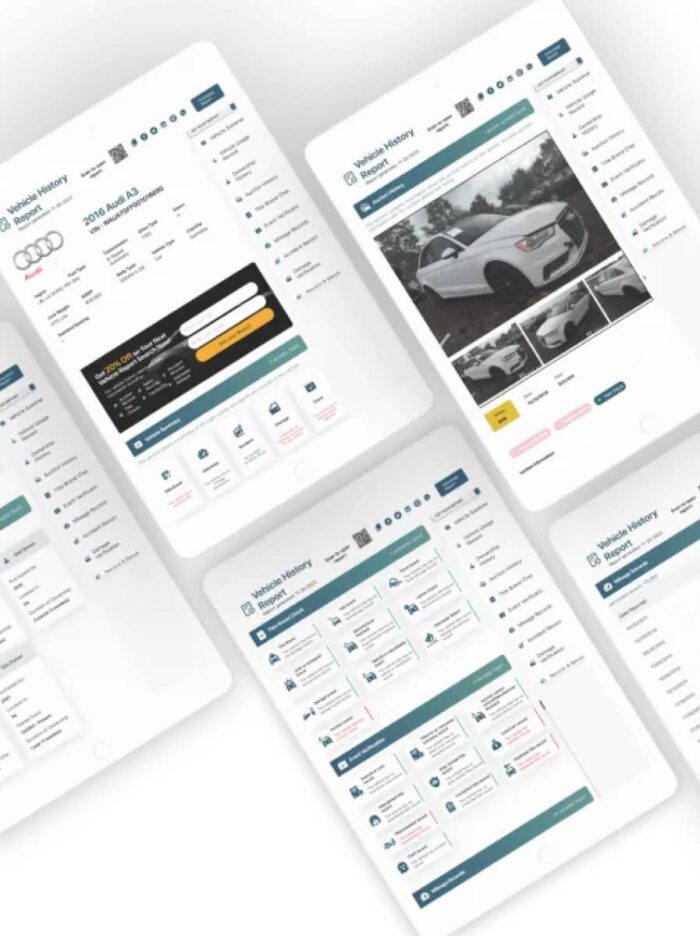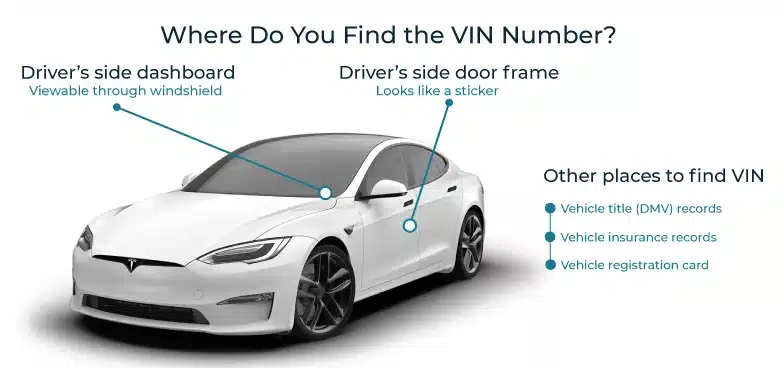Michigan VIN Check
Worried about hidden problems when buying a used car in Michigan? A VIN check helps expose liens, accidents, and odometer fraud, so you can buy with no worries and avoid scams easily.
Save Thousands with a Michigan VIN Check


- 2 accident record(s) found
- 1 Record of damage
- 12 service & repair record
What is a Michigan VIN Check?
Before purchasing a used car in Michigan, running a Michigan VIN check is essential to examine the vehicle. While sellers may leave out certain details, the VIN (Vehicle Identification Number) provides accurate records you can use.
A VIN check can reveal accident history, flood damage, odometer rollbacks, salvage or theft status, and more. With this information, you can make a confident and informed decision before you buy the used vehicle.
Why You Should Run a Michigan VIN Check?
Finding the Vehicle’s VIN
The VIN is typically printed on a sticker or metal plate located on the lower left corner of the dashboard, the driver’s side door jamb, the front of the car frame, or even beneath the spare tire. You can also find it on important documents such as the vehicle’s title, registration, or insurance card.
How to Run a Michigan VIN Check?
Running a Michigan VIN check is simple. Just follow these steps to access the full vehicle report before making your purchase:
Locate the VIN
Find the Vehicle Identification Number on the car itself (dashboard, driver’s side door jamb, or frame) or in documents like the bill of sale. If you don’t have access to the car, ask the seller to provide it.
Enter the VIN
Type the VIN or license plate number into the search form above and hit the “Search VIN” button.
Review and Get the Report
Within seconds, your detailed Michigan vehicle history report will be ready. You can view it online or download a PDF copy for safekeeping.
What Will You Get From a Michigan VIN Check?
Running a Michigan VIN Check and getting the report can help you simplify the background check process. In the report, you will see important information like the accident records, title status, odometer reading, and much more.
Accident Records
Learn if the car has been involved in any accidents, along with details like dates, locations, and the number of incidents. This helps you understand possible past damage.
Title Status
Confirm whether the vehicle holds a clean title or has ever been branded as salvage, rebuilt, lemon, junk/scrapped.
Real Mileage
Get the real mileage reading of the vehicle through the report. Check the date and recorded mileage, as well as the last recorded mileage of the vehicle before the vehicle.
Damage Reports
See if the vehicle has suffered damage from flooding, fire, hail, or other events that could impact long-term safety and reliability.

Recall Information
Check if the manufacturer has ever issued a safety recall for the car. See the date of recalls, issues addressed, and how the issues are handled. Make sure to check that the recalls are addressed properly.
Ownership History
Review past ownership records, including how many people owned the car, their locations, and how long they kept it.
Lien and Loan Records
Verify whether the vehicle has any outstanding liens or loans that could transfer to you after purchase.
Warranty Details
Find out if the vehicle is still under manufacturer or extended warranty, including mileage limits, coverage duration, and parts covered. See the mileage and the month of the limit.
Classic VIN Decoder in Michigan
Michigan’s rich automotive heritage and thriving classic car scene make it a dream destination for collectors and enthusiasts. With so many vintage treasures on the road and in museums, using a Classic Car VIN Decoder is the smartest way to verify authenticity, uncover hidden history, and protect your investment before buying a classic ride.
The Use of Michigan VIN Check in Real Life
Meema wanted to buy a used 2005 CHEVROLET ASTRO through a dealership in Lansing. The car looked nice and well-maintained, and the salesperson said that the car had just arrived last week. Through a manual inspection, Mima found nothing suspicious about the car. Then, she decided to run the Michigan VIN Check and get the report.
Sample VIN: 1GCDM19X85B112827
Seller’s Claim
- Clean title
- Properly maintained
- No damages
- Newly arrives
- Decent market price
Actual Car’s Condition
- 2 accident records found
- 2 lien or loan records
- 1 sale record
- 12 service & repair records
Outcome
- Meema decided to call it off because the vehicle was in an accident twice.
- Had unresolved lien/loan records.
Why is VIN Check Important?
- Helps you uncover the actual information of the vehicle.
- Protects you from buying a car with bad records, like having been in an accident twice.
What are the Benefits of Running a Michigan VIN Check?
Running the Michigan VIN check before you buy a used car is important. Aside from helping you get the full information of the vehicle, here are some more reasons to run the Michigan VIN Check.
Verify the Vehicle Isn’t Stolen
A stolen car can be seized by authorities, leaving you without both the vehicle and your money. A VIN report helps confirm whether the car is legally safe to buy.
Review Accident History
Accidents can cause structural, electrical, or body issues that may not be obvious. A vehicle report shows past accident records, so you can confirm repairs were properly done.
Check Recall Status
Manufacturers sometimes recall cars for safety or parts defects. If a recall exists, make sure the necessary repairs have been completed before purchasing.
Examine Maintenance Records
A well-maintained vehicle usually means fewer hidden problems. Reviewing service history gives you insights into how carefully the previous owners cared for the car.
Understand How the Vehicle Was Used
Usage matters, whether it was a taxi, rental, lease, or government car. Knowing its purpose helps you evaluate potential wear and tear.
Strengthen Your Negotiation
Armed with the report, you can confidently negotiate. If issues such as accidents, recalls, or theft history appear, use them as leverage to secure a fairer price.
Michigan Laws Related to VIN Checks
Title Transfers in Michigan
Transferring a title in Michigan requires specific steps and a few fees. When you buy a car, you need to transfer the title within 15 days. Fees are typically around $15, but additional charges may apply based on the situation. Proper title transfers ensure you officially own the vehicle.
Michigan Insurance and Registration
Michigan drivers must carry auto insurance, including Personal Injury Protection (PIP) and Property Protection Insurance (PPI). This coverage is necessary before you can register any vehicle.
Applying for Titles in Michigan
To apply for a title, visit the Secretary of State’s office with proof of ownership. Bring documents like the signed title from the seller, ID, and payment for fees. Registering a title keeps your car legally compliant, protecting you from future disputes.

Why Should You Check the Michigan VIN With DVH?
With Detailed Vehicle History, you can access quick and reliable VIN checks that reveal everything from title records to accident history.
Whether shopping through a private seller or a dealership, our reports provide the insights you need to make a smart and secure buying decision.
Useful Resources for Car Buyers in Michigan
If you’re buying a car in Michigan, there are helpful resources to keep handy:
Customers Testimonials
Excellent service
First time I ever used an online company to get a monroney. The website was easy to use and navigate through…Read More
Will Ruff
I have used this service several times. Thank you, Richard for your quick response and assistance. I am well pleased with your patience and assistance…Read More
Dee Hunter
I read about this on a car site and tried it. The results were very helpful such as accident and maintenance reports. I would do it again and recommend it.
Gordon Karsn
Run VIN Check in Other States
- Alaska
- Alabama
- Arizona
- Arkansas
- California
- Colorado
- Connecticut
- Delaware
- Florida
- Georgia
- Hawaii
- Idaho
- Illinois
- Indiana
- Iowa
- Kansas
- Kentucky
- Louisiana
- Maine
- Maryland
- Massachusetts
- Michigan
- Minnesota
- Mississippi
- Missouri
- Montana
- Nebraska
- Nevada
- New Hampshire
- New Jersey
- New Mexico
- New York
- North Dakota
- North Carolina
- Ohio
- Oklahoma
- Oregon
- Pennsylvania
- Rhode Island
- South Carolina
- South Dakota
- Tennessee
- Texas
- Utah
- Vermont
- Virginia
- Washington
- West Virginia
- Wisconsin
- Wyoming
FAQs About Michigan VIN Check
Can You Lookup up the Vehicle’s Title with VIN in Michigan?
Yes, you can look up the car’s title by using the Michigan VIN Check. Click on the form above and get the vehicle report, where you can examine the car’s actual title.
Is there a Free Michigan VIN Check?
You can run the Michigan VIN check by using our service. You can get the basic information of the vehicle like the trim, fuel usage, engine and transmission type, country of origin, and many more. Use the free Michigan VIN check to see if the car matches your needs.
How do I Check the VIN Number in Michigan?
Yes, you can check a VIN number in Michigan by using our service. Click on the form above and fill it out with the VIN.


